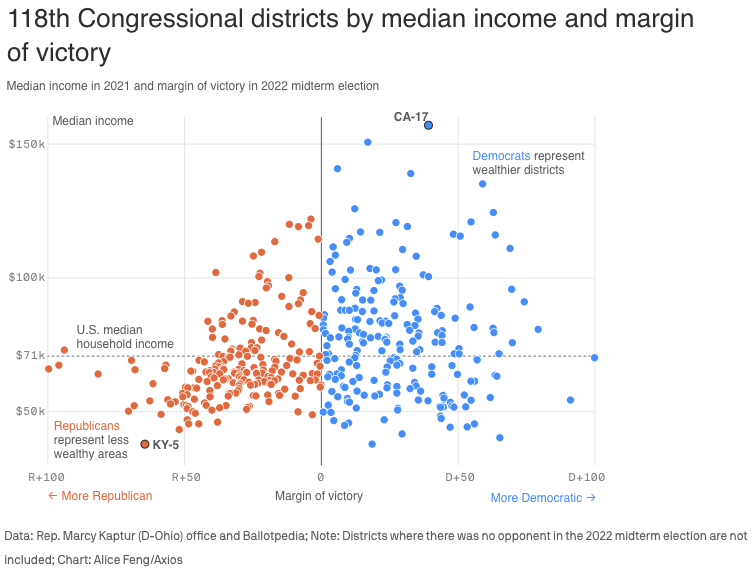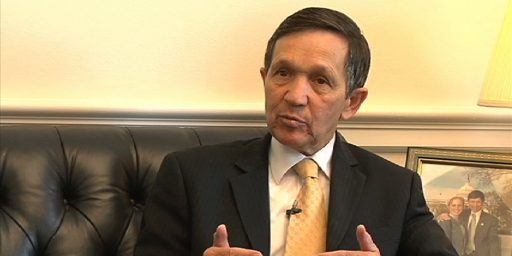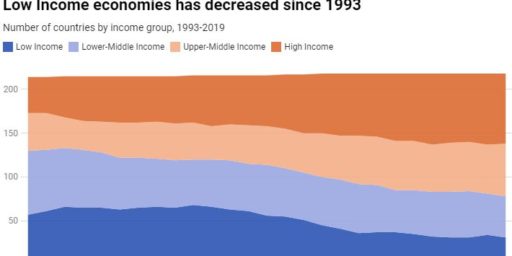Class Sorting in American Politics
Most high-income Congressional Districts are Democratic and low-income Districts are Republican.
The Axios headline “Dramatic realignment swings working-class districts toward GOP” is immediately followed by this graphic:

Because of the bizarre graphing—income is the independent variable and should be represented on the X axis whereas tendency to vote Republican is the dependent variable and should be represented on the Y axis–I initially thought we had a perfect sort in which all of the districts below median income voted Republican and all those above it voted Democratic. But, no, they threw margin of victory in as a third variable and screwed up the chart.
Anywho, the results are still interesting, if not as stark as the visualization suggested.
Nine of the top 10 wealthiest congressional districts are represented by Democrats, while Republicans now represent most of the poorer half of the country, according to median income data provided by Rep. Marcy Kaptur’s (D-Ohio) office.
Why it matters: The last several decades have ushered in a dramatic political realignment, as the GOP has broadened its appeal to a more diverse working class and Democrats have become the party of wealthier, more-educated voters.
- “Republicans were the party of the country club, and they’re increasingly the party of country,” lobbyist and political analyst Bruce Mehlman told Axios.
- “We have seen an inversion of Democrat and Republican shares of the highest- and lowest-income districts — and the highest and lowest college degree-holding districts,” Cook Political Report’s Dave Wasserman told Axios.
That is truly a huge switch, although one we knew had happened at the Presidential level already. This is especially bizarre given the policy preferences the parties demonstrate while in office. Historically, the party representing the poor and uneducated advocated for social welfare programs and income redistribution whereas the party representing the rich and educated advocated for programs that were “business-friendly.” We now have an inversion.
By the numbers: 64% of congressional districts with median incomes below the national median are now represented by Republicans — a shift in historical party demographics, the data shows.
- Some of the highest-income districts have long voted Democrat, but growing inequality is widening the gap between them and working-class swing districts critical to winning majorities.
- “Increasingly, districts that make up the majority of the Democratic caucus don’t really reflect the middle-income districts where the House is won and lost,” Wasserman said.
I’m not sure that follows. Every Congressional district counts the same, after all, and Democratic losses in poorer districts would seem to be offset by gains in richer ones.
Zoom in: Democrats are still competitive and have held on to a number of swingy, middle-income districts, including Kaptur’s in Ohio. She is one of only five House Democrats representing districts won by former President Trump.
- Kaptur often shows a similar chart ranking districts by median income to fellow Democrats — and has even given a version to President Biden.
- “It’s one way for her to highlight … that there are still those districts, especially in middle America away from the coasts, that are not feeling the benefit of all the policies in place,” a Kaptur aide told Axios. “That there is still work to be done to uplift these communities.”
- Kaptur also sees another interpretation: “The other way you could look at it is: how is it possible that Republicans are representing the majority of people who struggle?” she told Insider, which first reported on the chart.
Kaptur seems to have fallen prey to the ecological fallacy here. Just because a Congressional district—which in some cases are an entire state—is rich or poor doesn’t mean everyone living there is. Republicans are winning the white working class but poor Blacks and Hispanics still vote overwhelmingly Democratic.
Between the lines: The relationship between geography, education, income and politics is complex — and experts point to education as a stronger indicator of party affiliation.
- “I suspect income is downstream of education and geography. Voters with college degrees or more earn higher salaries, live where homes cost more and increasingly skew Democratic,” Mehlman said.
There’s something of a chicken-egg thing here but yes. A lot of well educated folks, myself included, have left poorer parts of the country for better opportunities. For the most part, this means moving to major metropolitan areas. While a lot of them are now in Red states in the Sun Belt, the cities themselves tend to be relatively progressive. And even those of us who are relatively conservative are put off by white supremacist and anti-science rants that are increasingly used by a GOP trying to hold onto power by appealing to the prejudices and resentments of rural whites.
The big picture: Class politics has become a driving force in the past several elections, supercharged by Donald Trump’s populist plea to middle-class, blue collar workers in 2016.
- An increase in less-educated, lower-income GOP primary voters could benefit Trump as he seeks the 2024 nomination, as CNN points out.
- Meanwhile, “the more the Democratic Party becomes defined or stereotyped by elites and coastal interests with a lot of money, the harder it is to win the middle-income districts that they need to get to 218 [seats],” Wasserman said.
- Still, Democrats are hopeful that strong and sustained messaging on some of Biden’s biggest legislative wins — and House Republicans’ threats to cut popular social programs — could help them shore up some working-class voters.
Look, messaging obviously matters and the Biden team has let itself get painted as leftist on a handful of issues and not gotten enough credit for some shrewd investments made as part of the overall Inflation Reduction Act boondoggle. But it simply doesn’t make sense to continue to conflate “middle-income” with “(White) working-class.” Sure, there are a lot of plumbers, electricians, and contractors in that group, but there are more white collar folks with college degrees. Moreover, with each passing day, there are fewer Whites and geriatrics.
What they’re saying: “While House Democrats expanded broadband internet, capped the cost of insulin, and cut child poverty in half, Republicans did everything they could to stop them from helping middle- and working-class families,” DCCC spokesperson Tommy Garcia told Axios, criticizing Republicans aims to cut federal spending.
- On the other side, Kaptur as well as the other Trump-district Democrats are top targets for Republicans hoping to expand their House majority.
- “Marcy Kaptur is well aware that Democrats like herself no longer represent the working class,” NRCC spokesman Chris Gustafson said in a statement last month.
The essence of White working-class resentment, though, is that welfare programs and the like are bad, even if they help White working-class folks, because they disproportionately help Blacks and Hispanics. They’ll simultaneously take the subsidies and be angry about it.
Indeed, the dueling statements from the party spokesmen show a divide: Democrats are selling programs while Republicans are selling identity. Whether Kaptur is advocating for policies that would be good for her district is irrelevant because she’s not one of them. That’s a hard sell, though, since she’s lived in the area her whole life, represented them in Congress for four decades, and has consistently won re-election by huge margins even as her constituents vote Republican for President.






That poor working class white guy doesn’t classify himself as being aligned economically, socially, or culturally with the equally poor working class black or Hispanic guys. In his mind, he’s still a member of the ruling class because he’s white. Something about proletarians and temporarily embarrassed capitalists comes to mind …
Don’t underestimate the effect of gerrymandering. Increasingly, the districts created are choosing the voters, not the other way around. Maybe the various vothing demographics haven’t changed that much but are artificially grouped together.
The white working class started abandoning the Democrats during the Vietnam War.
While this is interesting data but, as James points out, there are so many complicating factors the the stated conclusions don’t necessarily follow. For example, a seriously red state like Tennessee or Mississippi is going to be more red in districts at every income level. They also happen to be substantially poorer than the more typical blue state. So is it that Republicans are popular with lower income people as the author states, or is that Republican states just happen to be poorer? You can use this data to make either case, and there are a hundred other things you would need to suss out before you could determine what, if any, conclusions you can draw.
Fantastic PR getting the poorest to vote against their best interests. Just stoke the rage and fear
I think the short hand used is too narrow. We talk about working class (white or otherwise) and the professional, educated class. Those are too broad of categories. The ownership class (small business owners, franchise owners, real estate brokerages, etc.) are, I believe, by and large, Republican and Trump voters. The Trump boat parades come from this class. And they don’t consider themselves rich. Then there is the white collar employee class (buyers, contracts people, HR, IT). They are a mixed bag politically, I would guess. I think too much stereotyping goes on to have a really useful analysis.
Good analysis James. Could add on thoughts:
100% this. I would have liked to see this accounted for more. Also some thought around both the impact of gerrymanderings (in States like Wisconsin) and also geographic sorting in the Midwest.
Right. This is also in part an assumption that they’ve (white folks) “earned” the social safetynet where as the others are takers. It’s also worth noting that despite definite disparities in terms of who is getting benefits, in sheer numbers (due to differences in population size) the vast majority of benefits recipients are White.
@HarvardLaw92:
Yes and no. Based on polling, its definitely the case with working-class black folks (though the expectation to some degree appears to be that even though those black folks are “working class” they are assumed not to be “working” which is part of the perception issue).
Feelings about Hispanic folks are growing increasingly complex. There’s an increasing proportion of “White Hispanics” that don’t appear to be percieved in the same negative way–especially if they are seen as being in the US legally or are already citizens. In fact that’s been one of the areas of recent growth for the Republican party.
Colorism and immigration status seem to be the bigger dividing lines right now (including with some of those White Hispanic folks). That is a major issue that many Democratic leaders haven’t really wrapped their heads around (at least based on public statements/tactics). Hispanics, as has often been brought up here, are anything but a monolithic block and honestly I think Republicans are figuring this out faster than Democrats.
Indeed an odd graph. Mostly I think it shows that people who are bad at math shouldn’t make graphs and most journalists are bad at math. However I don’t entirely agree, James, with your concern that income should have been plotted as the independent variable. Voting red does make you poorer. But yes, wealth here may be largely a surrogate for urban geography and education. Oddly, the vertical axis labels line up with the grid here, but they don’t if I follow the link to Axios. And dropping the 35 districts without a major party opponent seems arbitrary. If I try to eyeball a best fit line, it has a lowish slope, indicating a lowish dependence on income.
I dislike statements like, “Nine of the top 10 wealthiest congressional districts are represented by Democrats”. Mostly, you just showed me a picture, I can see that. But also it’s cherry-picked. It’s also true that 14 of the 25 districts at or below 50K went blue.
It’s hard to tell where Kaptur is a bit confused or Axios is. But Kaptur apparently wants Ds to do more for her district economically because they’re voting red for culture war reasons which does not compute. The lesson would seem to be Ds should keep, as they are, helping her district economically but do a better job of messaging on culture issues. As guns and abortion give them a golden opportunity to do.
I’m noticing something else in the graph – the distribution of Democratic districts is pretty uniform regardless of income level. The blue is spread out quite evenly.
The Republican districts, however, are narrowly clustered between $50K and ~$72K of income, with just a few “elite” higher-end Republican districts.
In my view, this is pretty good news for the Democrats because “outreach” can be narrowly tailored to a specific group that is not already in the big tent.
Republicans were the party of the country club, and they’re increasingly the party of country,” lobbyist and political analyst Bruce Mehlman told Axios.
The ‘country club’ has not been the class thing in the American imagination for some time. The GOP is still the party of the country club–it’s just that the country club as class signifier has been overshadowed by dozens of other signifiers all with equal power.
One of the signifiers is being able to handle complexity, and that is what the GOP is set against. It’s a specific type of class warfare which is being waged. They love golf, rich guys who own signed copies of Mein Kampf to honor the Holocaust, and The Federalist Society bribing everybody, but they don’t like normal well-educated people who don’t alienate everyone with manifestos about the homeless. It’s why the freak show.
Would really need to normalize that for cost of living in the district since a high salaried person may still feel poor in a high cost of living environment.
And really, especially given the prevalence of districts around DC, the driver could very well be the white-collar working class. They may be highly credentialed, but they aren’t owner-class as they are paid on time spent doing the work assigned by their employer, using the tools provided by their employers, generally at the time and place determined by their employer. They get a W-2, not a 1099 or file taxes on an enterprise that provides their income. They may very well exhibit
attitude even though the cashflow is high with their income.
And we must admit that Democrats have been successful in enforcing conformity on the “educated strata”, a demographic storied in its gullibility. To vote Republican is social death. But some indications are that more and more are amenable to take the risk based after 2 years of Biden/Democrats.
@JKB: That has to be one of my least favorite quotations of Lewis’. If you are going to try to draw wisdom from his writings, I think A Grief Observed is a much better choice. Maybe also Until We Have Faces.
Lewis himself has all the smugness of the people he is criticizing in your quote. He acknowledges this in A Grief Observed.
Meanwhile, there is no shortage of people who think they know exactly how the world works among the working class – from whence I come, by the way.
Money is increasingly about education, education is about intelligence, so this is basically an IQ sorting – smart people on the Left, not-so-smart people on the Right. MAGA took over the GOP because Trump is the perfect candidate for stupid people so the GOP shrugged off its history and gave up pretending to have anything to offer to anyone with an IQ above room temperature in a Houston mall.
Interesting though that we are back to a form of inherited wealth. Whether intelligence is genetic or environmental doesn’t change the fact that it is in effect an inherited power.
@JKB:
Oh? Evidence?
@Michael Reynolds:
Sometimes, Micheal, you just crack me up
@Michael Reynolds: FWIW, I think we confuse the 10-20% of a party that represent true believers, and the 80-90% who just go along to get along. There are lots of smart and decent life-long Republicans who simply don’t ever examine their Party in any meaningful way, and an equal number of Democrats. In fact, that’s the norm. We are the oddballs.
I’m sure you can hang out at the Feed and Seed or something.
I don’t want people who hate me or my friends at a party. I don’t want to hang out with them.
It turns out that when you call people pedophiles and groomers, those people don’t like you*. I would assume you don’t like them either and don’t want to hang out with them, but whatever dude, I kind of don’t give a shit what goes on in your little head after that.
——
*: or if you vote for those people or hang out with them…
@MarkedMan:
I think your numbers are very optimistic. I’d reverse them and say that 70% of the GOP are MAGAts, another 25% go along, and Liz Cheney is the remaining 5%. There is no real disagreement in the GOP on issues.
It’s good to see people who understand the ecological fallacy.
I see it from time to time in news articles, but so far haven’t tried to get a correction printed. Or broadcast. I suppose I should try some time, even though I am not optimistic about getting a correction.
@Michael Reynolds:
* 15% true believers, the folks who literally believe the bullshit du jour. They are very angry Republicans get nothing done. They want arrests, prison camps, people cowering in fear, etc.
* 25% nihilist spite addicts, the folks who just want to make libs suffer and have no agenda other than status quo on most issues and maintaining power, but really want to hurt libs, as a treat. They are happy that Republicans accomplish nothing, that’s the goal. They might not like the abortion decisions, because it risks Republicans getting voted out, and replaced by people who want to get things done.
* > 55% going along, they barely think about politics. They don’t like the status quo, but don’t know Republicans get nothing done. They just know Dems promise things, but things never happen, so figure Dems must be lying rather than be stymied.
* < 5% Lynn Cheney
Both the 15 and 25% identify as MAGA. The 15% has a bit of Q.
Democrats are the party of the managerial class, which is made up of the college credentialed who are to numerous for the economy to support as it is. So wokism creates make-work jobs in the same way the mob imposed on businesses.
Came across this today
Malcom Kyeyune
Wokeness, the Highest Stage of Managerialism
Sub title to article by Malcom Kyeyune
“Well-educated progressives wield institutional power to impose a new political and social order.”
My take on another matter.
Republican Florida Governor wields the power of the state to eliminate Black and Transgender history and intimidate political opponents and to appeal to the fears of his constituents.
Some commenters here offer up older writings to suport their ideas.
Here’s a reference from more than 238 years ago.
Not that it has anything to do with current events.
@JKB: Even while the middle of the country is on fire with propane and plastics billowing smoke in the air due to reduced environmental protections, while trains all over the country are derailing due to lowered safety standards – polluting farms, rivers, and streams, while corporations conspire to squeeze every last dollar out of the consumer class – even while paying that consumer/worker as little as possible and bitching that she doesn’t spend enough to keep the economy going — even with all this going on, JKB comes on here and advocates for fewer “job-killing regulations”.
It’s dizzying.
Warning, Anecdotal Observation.
I’m from a working middle class Catholic Republican family of ten. We were a public safety (police) family as were most family friends (police or fire).
The vast majority of my family and our family friends supported (and still support) Trump. To me it distills down to 2 basic reasons: (1) they really like his pugnacious belligerent style, he fights for everything, and (2) the culture stuff, it activates. It does not make a difference to them if Trump is openly dishonest and corrupt. Why? Because they believe that the whole political environment in Washington is an open sewer, and ‘both sides do it.’
@Michael Reynolds:
It may depend on where you are. No New England Republican governor can stand Trump, particularly Charlie Baker, who could barely speak the name without gagging. The same is true of most run-of-the-mill Republicans up here.